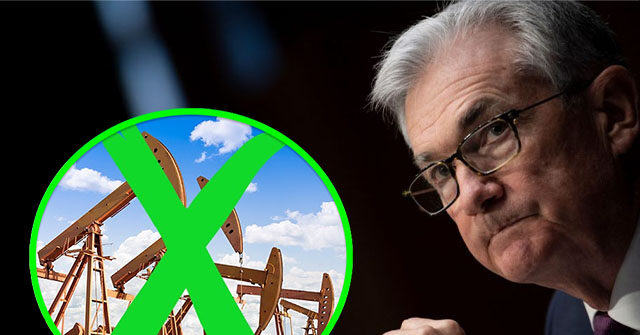Breitbart Business Digest: Powell Stands Up to the Climate Bullies

While markets were listening for hints yesterday from Jerome Powell about a possible shift in the central bank’s stance on inflation following the softer-than-expected wage numbers in the December jobs report, the Federal Reserve chairman unexpectedly issued an edict about the limits of his institution’s authority. “Without explicit congressional legislation, it would be inappropriate for us to use our monetary policy or supervisory tools to promote a greener economy or to achieve other climate-based goals,” Powell said during a panel discussion Tuesday hosted by Sweden’s central bank. “We are not, and will not be, a ‘climate policymaker.'” That was an admirably forthright rejection of calls from the American left for the Fed to use its bank supervisory authorities to mitigate climate change.
The left, including some leading Democratic lawmakers and a few people President Biden has tried to appoint to financial regulatory bodies, has been quite openly pushing for the Fed to use its oversight and regulatory powers to incentivize banks to provide more financing for green projects and less for carbon-emission producing enterprises.
The most prominent of these voices was Sarah Bloom Raskin, who Biden tapped for the position of Vice Chair of Supervision at the Fed, perhaps the most important bank regulatory position in the U.S. As Breitbart News reported last year, Raskin had “adopted the stance that the way to fight climate change was to discourage fossil fuel development by having bank regulators discourage investment in the sector. ” She couched her calls for the Fed to become a climate policy maker in a twisted pretzel of illogic that she called “transition risk.” As she explained it, “transition risk” is the risk that banks could be destabilized by a rapid rejection by the public or policymakers of carbon-intensive businesses which had borrowed from these banks to support their enterprises. Raskin wanted Fed policy to encourage banks to decarbonize their portfolios, supposedly in the name of financial stability. Sarah Bloom Raskin, nominee to be vice chairman for supervision of the Federal Reserve Board of Governors, is sworn in before her Senate confirmation hearing on February 3, 2022, in Washington, DC. (Bill Clark/Getty Images) “The Fed is singularly poised to seed strategic investments in future economic stability,” Raskin argued in a 2020 op-ed for the New York Times. What does that mean? Here’s what Raskin wrote: The Fed’s unique independence affords it a powerful role, and its mandate includes ensuring both the stability of the financial system and full employment. Climate change threatens financial stability; addressing it can create economic opportunity and more jobs.
The decisions the Fed makes on our behalf should build toward a stronger economy with more jobs in innovative industries — not prop up and enrich dying ones. In other words, the Fed should push the green agenda by discouraging lending to fossil fuels and encouraging lending to energy sources favored by climate change activists.
The irony of this was that the real “transition risk” was already running, and it was the opposite of what Raskin highlighted.
The United States and Europe had already gone too far in transitioning away from fossil fuels.
The U.S. underfunded oil and natural gas extraction, in part because of the ESG investment fad and in part because of political pressure on banks.
The irresponsible over-investment in the prior decade, which inflicted billions of dollars of losses on investors, also contributed to the problem. Europe’s under-investment led it to a dangerous dependency on Russia—the risks of which became undeniable after the invasion of Ukraine. Fortunately, Sen. Joe Manchin (D-WV) and every Republican senator on the Banking Committee realized that regulating climate through novel bank supervisory stances was a bad idea. Biden was forced to withdraw his Raskin nomination. While the nomination died, the idea behind it lives on.
The left is still intent on “addressing climate change” by stymieing financing of oil and gas production—and using federal bank regulators to make this happen. Powell knows that his position will be unpopular with the White House and Capitol Hill Democrats—as well as the European audience he was addressing in Sweden. His willingness to take this stance and the criticism that will certainly follow can be read as a sign that he is not afraid of the political or pundit classes. That should be taken as a warning to those who think he will give up the fight against inflation at the first signs of an economic slump.
Read the full article at the original website
References:
- https://www.breitbart.com/tag/sarah-bloom-raskin/
- https://www.breitbart.com/economy/2022/03/18/breitbart-business-digest-sarah-bloom-raskins-risky-bet/
- https://www.breitbart.com/terms-of-use/
- https://www.breitbart.com/privacy-policy/
- https://www.nytimes.com/2020/05/28/opinion/fed-fossil-fuels.html
- https://www.breitbart.com/politics/2022/03/15/joe-biden-bails-on-sarah-bloom-raskin-nomination-to-federal-reserve/
